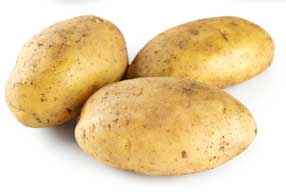





|
1. Potato Facts
|
|
2. Types of Potato (Australia)
|
|
3. Potato Nutritional Value
|
|
4. Potato Health Benefits
|
One of the worlds most cultivated vegetables, the potato is a member of the nightshade family, which also includes tomatoes, eggplants, peppers / capsicum. On average each global citizen eats 33kg of potatoes each year. Australians, clearly potato lovers, eat a whopping 60kg per person every year! The potatoes flesh or bulb is grown underground and is known for its high nutritional values.
In 1995 the potato became the first vegetable to be grown in space when seeds were germinated on the spaceshuttle Columbia.
History and Origin
The Inca Indians in Peru are thought to be the first to cultivate potatoes around 8,000 BC to 5,000 B.C. The Incas had many uses for potatoes, which ranged in size from a small nut to an apple and in colour from red and gold to blue and black. They placed raw potato slices on broken bones, carried them to prevent rheumatism and ate them with other foods to prevent indigestion. The Incas also used potatoes to measure time by correlating units of time with how long it took potatoes to grow.
It is reported that the Spanish conquistadores discovered the potato somewhere between 1532 - 1537 when they arrived in Peru searching for gold. When they returned they introduced potatoes to Europe, before the end of the sixteenth century, families of Basque sailors began to cultivate potatoes along the Biscay coast of northern Spain.
- • Atlantic
- • Bintje
- • Bison
- • Carisma
- • Coliban
- • Desiree
- • Dutch Cream
- • Eureka
- • Exton
- • Harmony
- • Kennebec
- • Kestrel
- • King Edward
- • Kipfler
- • Lady Christl
- • Maranca
- • Mondial
- • Mozart
- • Nadine
- • Nicola
- • Otway Red
- • Patrone
- • Pink eye (Southern Gold)
- • Pink Fir Apple
- • Pontiac
- • Red Rascal
- • Royal Blue
- • Ruby Lou
- • Purple Congo
- • Russet Burbank
- • Savanna
- • Sebago
- • Sifra
- • Toolangi Delight
- • Virginia Rose
- • White Star
Vegetables " Potato "
Nutritional value per 100 g
Potatoes, boiled, cooked in skin, flesh, without salt
|
Nutrient ( Proximate's )
|
Unit
|
Value
|
Daily Value %
|
|
Energy
|
kcal
|
87 | 4.3% |
|
Protein
|
g
|
1.87 | 3.7% |
|
Total lipid (fat)
|
g
|
0.10 | 0.1% |
|
Carbohydrate, by difference
|
g
|
20.13 | 7,3% |
|
Fiber, total dietary
|
g
|
1.8 | 6.4% |
|
Sugars, total
|
g
|
0.91
|
|
|
Minerals
|
|||
|
Calcium, Ca
|
mg
|
5 | 0.3% |
|
Iron, Fe
|
mg
|
0.31 | 1.7% |
|
Magnesium, Mg
|
mg
|
22 | 5.2% |
|
Phosphorus, P
|
mg
|
44 | 3.5% |
|
Potassium, K
|
mg
|
379 | 8% |
|
Sodium, Na
|
mg
|
4 | 0.1% |
|
Zinc, Zn
|
mg
|
0.30 | 2.7% |
|
Copper, Cu
|
mg
|
0.188 | 20.8% |
|
Manganese, Mn
|
mg
|
0.138 | 6% |
|
Selenium, Se
|
mcg
|
0.3 | 0.5% |
|
Vitamins
|
|||
|
Vitamin C, total ascorbic acid
|
mg
|
13.0 | 14.4% |
|
Thiamin (B-1)
|
mg
|
0.106 | 8.8% |
|
Riboflavin (B-2)
|
mg
|
0.020 | 1.5% |
|
Niacin (B-3)
|
mg
|
1.439 | 8.9% |
|
Pantothenic acid (B-5)
|
mg
|
0.520 | 10.4% |
|
Vitamin B-6
|
mg
|
0.299 | 17.5% |
|
Folate, total (B-9)
|
mcg
|
10 | 2.5% |
|
Vitamin B-12
|
mcg
|
0.00
|
|
|
Vitamin A, RAE
|
mcg
|
0 | |
|
Vitamin E (alpha-tocopherol)
|
mg
|
0.01 | 00.6% |
|
Vitamin D (D2 + D3)
|
mcg
|
0
|
|
|
Vitamin K (phylloquinone)
|
mcg
|
2.2 | 1.8% |
|
Lipids
|
|||
|
Saturated Fatty Acids
|
g
|
0.026
|
0.1% |
|
Monounsaturated Fatty Acids
|
g
|
0.002
|
|
|
Polyunsaturated Fatty Acids
|
g
|
0.043
|
|
|
Trans Fatty Acids
|
g
|
0.000
|
|
|
Carotenoids
|
|||
|
Beta-Carotene
|
mcg
|
2
|
|
|
Alpha-Carotene
|
mcg
|
||
|
Beta-Cryptoxanthin
|
mcg
|
||
|
Lutein + zeaxanthin
|
mcg
|
10
|
|

|
Reference Values are based on a 2,000 Calorie Intake, for Adults and Children 4 or More Years of Age. Your daily values may be higher or lower depending on your calorie needs.
|
|
Percentages are roughly approximated using (RDA) Recommended Dietary Allowances for adults. Source: USDA United States Department of Agriculture
|
|
Reference Values for Nutrition - FDA U.S. Food and Drug Administration
|
Potato Nutritional Value
Potatoes are one of the most nutritious foods you can eat. One medium sized potato has fewer calories than a grapefruit, more potassium than a banana, and more usable iron than any other vegetable. Potatoes are high in fiber, and loaded with complex carbohydrates.
Potato has many health benefits. Add potato to your diet to improve brain function, relieve stress, increase your fiber, have a positive effect on diabetes, alleviate kidney stones, treat your skin, treat dark spots, diminish inflammation and enhance your general health.
Potatoes as a very good source of vitamin B6, a good source of potassium, copper, vitamin C, manganese, phosphorus, niacin, dietary fiber, and pantothenic acid.
A potato skin contains significant nutrients, but so does the flesh, and determining which one has more isn’t as straightforward as you might expect. Potatoes are a rich source of fiber, iron, vitamin C and vitamin B-6, but to get the most nutrients you’ll need to eat the whole potato. The skin contributes more of some nutrients while the flesh has more of others.
Most people eat potatoes in the form of greasy French fries or potato chips, and even baked potatoes are typically loaded down with fats such as butter, sour cream, melted cheese and bacon bits. Take away the extra fat and deep frying, and a baked potato is an exceptionally healthy low calorie, high fiber food that offers significant protection against cardiovascular disease and cancer.
Potatoes contain a variety of phytonutrients that have antioxidant activity. Among these important health-promoting compounds are carotenoids, flavonoids, and caffeic acid, as well as unique tuber storage proteins, such as patatin, which exhibit activity against free radicals.
Researchers have identified blood pressure-lowering compounds called kukoamines in potatoes. It has a high concentration of vitamin B6 which is essential for the formation of virtually all new cells in the body and plays numerous roles in our nervous system, many of which involve neurological (brain cell) activity. Vitamin B6 plays another critically important role in methylation, a chemical process in which methyl groups are transferred from one molecule to another. Methylation is important to cardiovascular health and is particularly important in cancer prevention since one of the genes that can be switched on and off is the tumour suppressor gene, p53. Another way that methylation helps prevent cancer is by attaching methyl groups to toxic substances to make them less toxic and encourage their elimination from the body.
- BONE HEALTH (Calcium and magnesium)
- BLOOD PRESSURE (Potassium)
- INFLAMMATION (Choline)
- DIGESTION AND REGULARITY (High fiber)
- METABOLISM (Vitamin B-6)

- BRAIN FUNCTION (Vitamin B6)
- HEART HEALTH (Vitamin B6 & Methylation process)
- CANCER (Folate & antioxidants)
- WEIGHT MANAGEMENT (Dietary fiber)
- SKIN (Vitamin C)
References
|
Nutrient Database - USDA (United States Department of Agriculture)
|
|
Reference Values for Nutrition - FDA U.S. Food and Drug Administration
|
